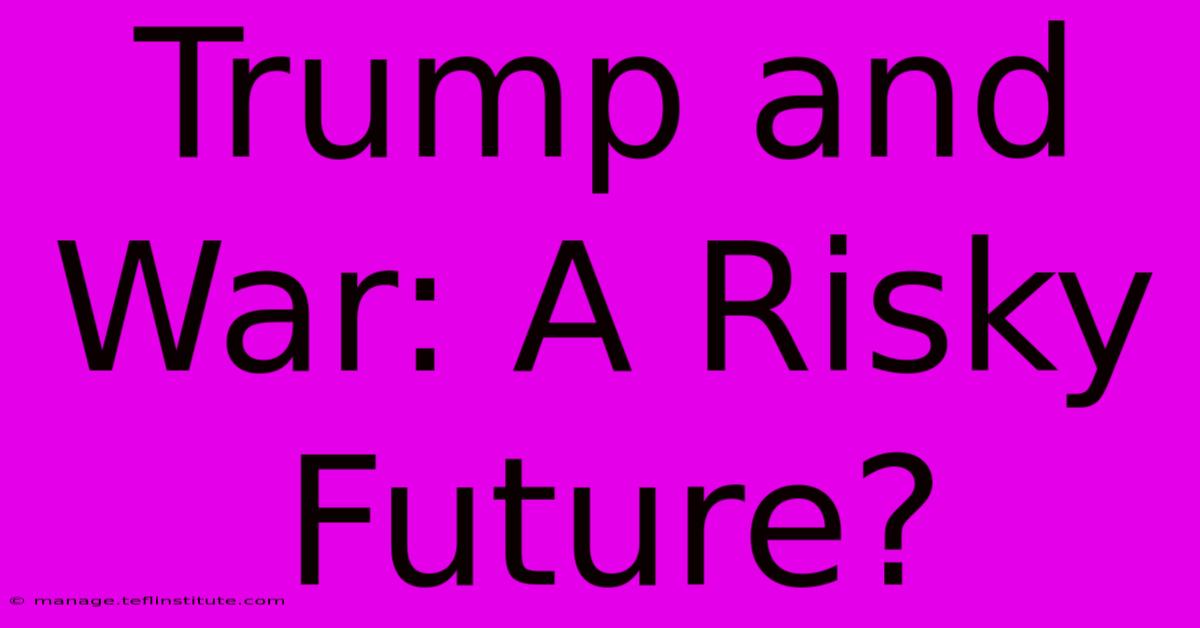Trump And War: A Risky Future?

Table of Contents
Trump and War: A Risky Future?
Donald Trump's presidency was marked by a foreign policy characterized by unpredictability and a departure from established norms. While he campaigned on an "America First" platform promising to end "endless wars," his administration's actions generated significant debate about the potential for escalating conflict and the long-term implications for global stability. Analyzing his approach reveals a complex picture, one that raises serious questions about the risks he posed, and continues to pose, to global peace.
One of the most prominent aspects of Trump's foreign policy was his skepticism towards traditional alliances and international organizations. He frequently criticized NATO, questioning the commitment of its members and suggesting that the US might withdraw its support. This raised concerns about the weakening of collective security arrangements that had helped maintain peace in Europe for decades. Similarly, his administration's withdrawal from the Iran nuclear deal and the Paris Agreement on climate change signaled a retreat from multilateralism and a prioritization of unilateral action. Such actions undermined international cooperation and created uncertainty about US commitment to global agreements, potentially emboldening adversaries and destabilizing already fragile regions.
Trump's rhetoric and actions towards North Korea presented another area of significant concern. While initially engaging in fiery exchanges with Kim Jong Un, he later held unprecedented summits, aiming for diplomatic solutions. This unpredictable approach, swinging between threats of military action and diplomatic overtures, created volatility and uncertainty, leaving analysts struggling to gauge the real intentions behind his actions. While the summits did not ultimately achieve denuclearization, the erratic approach itself posed a risk of miscalculation and accidental escalation.
The Trump administration's approach to the Middle East also generated considerable debate. While withdrawing troops from Syria and Afghanistan was consistent with his "America First" rhetoric, critics argued that the hasty nature of these withdrawals created a power vacuum, potentially leading to further instability and empowering terrorist groups. His administration's support for Saudi Arabia despite the Khashoggi assassination also raised questions about the prioritization of strategic interests over human rights. The continued involvement in conflicts like Yemen, though scaled down in some respects, further highlights the complexities and potential risks associated with his foreign policy decisions.
Furthermore, Trump's embrace of populist and nationalist narratives, often characterized by a rejection of global institutions and a focus on national interests above all else, fostered an environment where international cooperation was diminished. This approach could potentially embolden authoritarian regimes and weaken democratic norms, further increasing the likelihood of conflict.
However, it's important to note that assessing the full impact of Trump's presidency on the risk of war is a complex undertaking. Some argue that his unpredictable style, while unsettling, ultimately deterred adversaries through its unpredictability. Others point to instances where his actions, such as the increased pressure on Iran, inadvertently increased tensions.
Ultimately, the legacy of Trump's presidency on the question of war remains a subject of ongoing debate. While he avoided large-scale military interventions compared to some of his predecessors, his approach – characterized by unpredictability, skepticism towards alliances, and a prioritization of national interests above multilateral cooperation – created a risky environment that potentially increased the likelihood of miscalculation and conflict in several key regions. The long-term consequences of his actions, particularly in relation to the erosion of international norms and institutions, remain to be seen and could continue to shape the global security landscape for years to come. The question of whether his presidency ushered in a more or less risky future for global peace is one that will undoubtedly continue to be debated and analyzed for years to come.

Thank you for visiting our website wich cover about Trump And War: A Risky Future?. We hope the information provided has been useful to you. Feel free to contact us if you have any questions or need further assistance. See you next time and dont miss to bookmark.
Featured Posts
-
John Krasinski Named Sexiest Man Alive
Nov 14, 2024
-
Filipe Luis Wins Copa Do Brasil With Flamengo
Nov 14, 2024
-
Pete Hegseth Veteran Firebrand Now
Nov 14, 2024
-
Rainstorm Causes Widespread Flight Delays Evacuations
Nov 14, 2024
Latest Posts
-
Cold Snap Ahead Expect Winter Weather
Nov 15, 2024
-
Snow Warning Arctic Air Sweeps Uk
Nov 15, 2024
-
Arctic Air Snow Risk For Uk This Week
Nov 15, 2024
-
Uk Faces Snow Risk Arctic Blast Forecast
Nov 15, 2024
-
Uk Braces For Snow Arctic Air Arrives
Nov 15, 2024
-
Snow Threat For Uk As Arctic Air Hits
Nov 15, 2024
